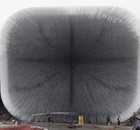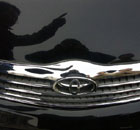Global Biz
Class-action lawsuits could cost Toyota $3B-plus
(Agencies)
Updated: 2010-03-10 02:59
 |
Large Medium Small |
Corporations often settle big cases rather than risk an even bigger damage award at a trial.
Automakers in the past have been forced to pay vehicle owners for lost value because of safety problems. Ford, for example, agreed in 2008 to compensate 800,000 Explorer owners who sued because of rollover dangers. That settlement provided owners only with vouchers of between $300 and $500 to buy new Ford products.
In that case, the lawyers received about $25 million in fees and costs, and the Toyota case could result in a similar windfall for attorneys. A study by the Federal Judicial Center concluded attorneys in class-action lawsuits typically get fees between 27 percent and 30 percent of what they recover in damages - which could reach $1 billion in a $3 billion settlement.
|
||||
The San Diego hearing will be conducted before the seven-member Judicial Panel on Multidistrict Litigation, which decides whether similar lawsuits filed in multiple federal districts should be centralized in one location for pretrial motions, hearings and the like. A federal judge would be chosen to determine whether the Toyota cases should be certified as a class action and make other key rulings, such as deciding on a likely Toyota motion to dismiss.
Under federal law, a class action must have 100 or more plaintiffs, damages sought must exceed $5 million and the judge must be persuaded the claims are identical or very similar. If a class is not certified, each lawsuit would have to be pursued on its own.
Toyota has so far recalled 5.6 million vehicles in the US because of problems caused by what it says are accelerator pedals that become sticky or get trapped under floor mats. Another 437,000 Prius models have been recalled worldwide for what Toyota says is an antilock-braking glitch.
The vast majority of lawsuits claiming economic loss stem from the accelerator problems, and many contend the company's effort to fix floor mats or accelerator pedals are insufficient. Dozens of lawsuits claim Toyota has ignored problems with its electronic throttle system.
Separately, NHTSA is looking into claims from more than 60 Toyota owners that their vehicles continue to surge forward unexpectedly despite having their vehicles repaired.
Toyota has denied that its electronic throttle is to blame and has been focused on dealing with the recalls - a strategy that could affect the outcome of the lawsuits.
"Toyota's strategy (should be) to fix them, fix them immediately and at no cost, and do it as quickly and effectively as you can so after the dust settles, your car's value won't have depreciated much," said Edward C. Martin, a law professor at Cumberland School of Law at Samford University in Birmingham, Alabama.
"We do not believe that electronics are at the root of this issue," Toyota spokesman Mike Michels said Monday.
In some of the lawsuits, Toyota owners seek additional damages because they're afraid to drive what they call "defective and dangerous" cars, while still others claim insurance premiums will likely go up.
"My wife has been worried about it for a while. She's eight months pregnant and she's terrified to drive the car now," said Jerry Borbon, a Miami lawyer who is still driving his 2008 Toyota Prius and is a plaintiff in a potential class-action lawsuit.
"We thought about trying to get rid of it, but we're stuck with it," he said, adding Toyota's damaged reputation has made it hard to sell the vehicle. "I don't feel secure in the car and I don't want my wife driving it."
"There are a lot of unknowns and the big questions are what did Toyota know when," said Catherine Sharkey, a professor at the New York University School of Law. "If it turns out that Toyota had knowledge of these defects and did not act soon enough, then the best strategy is settlement."
Bluestein reported from Atlanta. AP Business Writer Dan Strumpf in New York contributed to this story.










